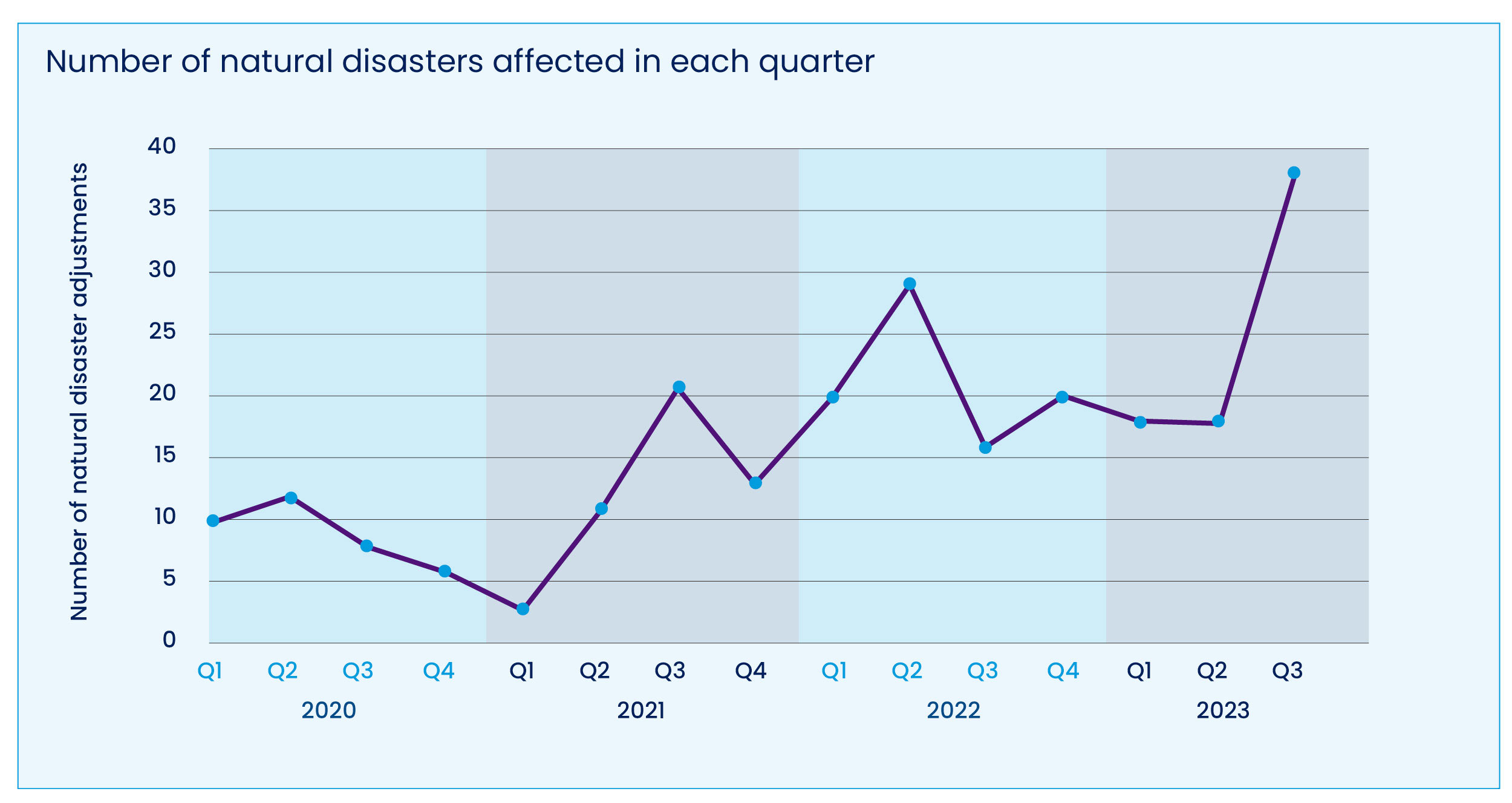- Increase in natural disasters. Data from the Federal Emergency Management Agency (FEMA) shows natural disaster occurrences in the U.S. have generally increased on a quarterly basis since the start of 2020.
- Impact on sales incentive plans. Sales targets may become unattainable due to supply chain disruptions and reduced physician access during and after the disaster. Maintaining data integrity and accurate performance tracking also becomes challenging.
- Have a plan in place. Organizations should consider an incentive process that not only addresses disasters when they occur via adjustments but also helps better plan for such events in advance.
Over the last few years, many organizations have spent an increasing amount of time making retroactive adjustments to their sales incentives to account for natural disasters.
Data from the Federal Emergency Management Agency (FEMA) shows natural disaster occurrences in the U.S. have generally increased on a quarterly basis since the start of 2020. The chart below depicts events declared by FEMA as a disaster/state of emergency that qualified for federal government assistance.

To be fair, incentives administration is not the first thing that comes to mind when organizations consider natural disasters and the catastrophic effects they can have on life and property. However, these disasters can have an impact on incentive programs by affecting the metrics and goals set within incentive plans. Sales targets may become unattainable due to supply chain disruptions and reduced physician access during and after the disaster. Maintaining data integrity and accurate performance tracking becomes challenging, potentially affecting employee morale and trust in the compensation process.
Organizations should consider adaptable incentive design and efficient processing protocols to navigate the complexities introduced by natural disasters as well as to maintain fairness and employee engagement.
The Importance of Plan Resilience
An incentive plan that is resilient to natural disasters can be important for a variety of reasons. These can include:
- Employees are more likely to remain motivated and engaged even during times of crisis, maintaining their focus on achieving performance goals.
- The financial impact on both the organization and its workforce may be minimized when disasters disrupt regular business hours and operations.
- An employer’s commitment to fairness and employee well-being is demonstrated, which can enhance morale and reduce turnover.
- The incentive process can continue to operate as usual and is less apt to create cascading delays in the months subsequent to the disaster event or to territories unaffected by the event.
- Stability and continuity are promoted, allowing for consistent performance tracking and evaluation, even in challenging circumstances.
- Organizational reputation can be safeguarded, as employees are more apt to perceive fairness and transparency in compensation practices, reinforcing trust and confidence in the company.
Organizations should consider an incentive process that not only addresses disasters when they occur via adjustments but also helps better plan for such events in advance. In doing so, they may consider a variety of proactive and reactive steps.
Proactive Steps
Consider the following to proactively design a resilient incentive plan to account for natural disasters:
- Build flexible timelines. Develop a timeline that incorporates flexibility, especially at the end of a quarter or performance period. Allow for deadline extensions or target revisions if an event significantly disrupts operations.
- Add a budget buffer. Include a buffer in the incentive budget to help ensure employees receive their target incentives even in challenging circumstances. This buffer may be used to maintain motivation and engagement during the disruption.
- Introduce indexing mechanisms. Design the plan with appropriate mechanisms, such as indexing, to protect against large changes in sales or performance metrics caused by such events. This helps maintain compensation fairness.
- Allow for manual adjustments. Develop a sales crediting and incentive calculation process that allows for manual adjustments. This flexibility can allow the company to accurately account for the resulting impacts.
- Define various types of disruptions. Establish a governance model or committee responsible for determining what constitutes a natural disaster vs. other disruptions. This enables a fair and consistent approach to address exceptional events.
- Plan for communication. Implement a clear communication plan to keep employees informed about the adjustments that may be made in response to natural disasters. Transparency can be critical to maintain trust and understanding.
- Assess — and strategize around — the risks. Regularly conduct risk assessments and scenario planning to identify parts of the incentive plan that pose a risk to timelines and develop subsequent mitigation strategies within the incentive plan.
Reactive Steps
Consider the following options to reactively handle natural disaster adjustments during incentive processing:
- Guarantee payments. Provide a guaranteed payment for the sales representatives covering the territories impacted by natural disasters if a given territory’s performance is below a certain threshold.
- Pay on target. Adjust the payment for employees whose territories are impacted by natural disasters, so their earnings are set to default (i.e., considering that the reps have achieved 100% of their quota).
- Weigh performance and target. Pursue fair compensation by comparing the performance of the employees and paying them on the better of performance and target.
- Adjust sales for the impacted period. Increase the sales for the impacted period to make the territory’s performance analogous with its previous performance if certain established thresholds are met. For example, take the better of the previous and impacted period relative to attainments when compared with national performance.
- Apply goals or baseline adjustments. Lowering goals or baselines for the duration of a natural disaster may display support of fair compensation. For example, if the natural disaster has created an impact for nine out of the 90 days in the quarter, consider reducing the goal by 10%.
Be Thoughtful and Have Forethought
Companies should be thoughtful in their implementation of adjustments for natural disasters. After all, the accuracy and fairness of incentives should be the last thing on sales reps’ minds when such events occur. But perhaps equally importantly, companies should anticipate the need for these adjustments, and design the incentive plans and process with the flexibility that allows for adjustments for these events without disrupting the normal course of business.
Editor’s Note: Additional Content
For more information and resources related to this article, see the pages below, which offer quick access to all WorldatWork content on these topics:








